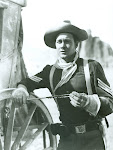
John Ford's first full length movie, Straight Shooting, was released. Prior to these he had made several short films, but this ws his most ambitious project to date. Starring Harry Carey, with whom he would make some 25 Westerns over the next four years, this is the only film from that collaboration to survive. It was rediscovered in a Czechoslovakian film vault in 1966. Fernando Martín Peña has a nice essay on the film at Fipresci, the the International Federation of Film Critics website:
What makes a man to wander? Where does Ethan Edwards come from in The Searchers (1956)? Probably from Straight Shooting (1917), as many have already noticed. Cheyenne Harry (Harry Carey) is a carefree outlaw hired by a cattleman to kill a farmer who does not want to leave his land. When he is about to do it, he's moved by the sight of the old man, mourning the death of his son, and decides to reform. The ending of the film is confusing — there are parts obviously missing or misplaced — and the titles are not reliable, because the print was found in Czechoslovakia and they had to be reconstructed from the Czech titles. However, it seems clear that Cheyenne Harry sets things right, feels unworthy of the farmer's offer to stay with him and replace his son (by becoming his son-in-law) and goes away. Fade out and some decades later we have Ethan Edwards.
But there are many more elements in Straight Shooting that prefigure future Ford films, which is quite bewildering given the fact that it actually was his first feature. How can a film be Fordian before Ford? Where does John Ford come from? Surely from David Wark Griffith and William S. Hart. The climax of Straight Shooting finds the ranchers besieged by the cattlemen in a cabin, much as in The Birth of a Nation (1915), and Ford always kept a direct link with the Master through the frequent casting of Mae Marsh (as Lindsay Anderson pointed out). The change that undergoes Carey's character is very close to the pattern set up by Hart in many films, and the austere, dusty western town in Straight Shooting is very close to Hart's imagery. But those obvious links don't explain it all because the film also contains at least three things that cannot be attributed either to Griffith or to Hart.
In the first place, the legendary "eye for composition," that natural gift that defined Ford's visual style, is already quite developed here, as Lindsay Anderson proved in his book.
In the second place, we already find here the somewhat tragic character who assumes the mediating role between the wild and the civilized and who will reappear over and over again in Ford's future westerns, notably in films like My Darling Clementine (1946) and The Man Who Shot Liberty Valance (1962). Like Fonda and Wayne in those films, Carey is not motivated only by virtue (like Hart). He's part of both worlds, but in fact, he's mostly wild: he rides with a band of outlaws, gets noisily drunk with the cattleman's main henchman, seems very happy at the prospect of killing for money and mainly survives by violence, unlike the civilized settlers who don't exactly know how to do that and therefore get killed. So Carey (like Fonda and Wayne) is the one who can exert violence against the violent and help wipe them out with the rest of the wild things, including himself, who feels out of place when the work is done.
In the second place, we already find here the somewhat tragic character who assumes the mediating role between the wild and the civilized and who will reappear over and over again in Ford's future westerns, notably in films like My Darling Clementine (1946) and The Man Who Shot Liberty Valance (1962). Like Fonda and Wayne in those films, Carey is not motivated only by virtue (like Hart). He's part of both worlds, but in fact, he's mostly wild: he rides with a band of outlaws, gets noisily drunk with the cattleman's main henchman, seems very happy at the prospect of killing for money and mainly survives by violence, unlike the civilized settlers who don't exactly know how to do that and therefore get killed. So Carey (like Fonda and Wayne) is the one who can exert violence against the violent and help wipe them out with the rest of the wild things, including himself, who feels out of place when the work is done.
And finally, Straight Shooting is devoid of the strong racism that permeates not only Griffith's work but also Hart's. In films like The Aryan (1916), Hart's hero degrades himself by joining an outlaw band exclusively formed by Indians and Mexicans (and quickly becomes their leader, which is presented as the natural thing that happens to a white man in that context). In Straight Shooting, Carey rides with — but does not lead — an outlaw band composed of Mexicans and Indians and afterwards gets their help to fight against the cattlemen and break the cabin siege. Everybody mixes happily in that climax, the outlaw band saves the day, and they even become equated with the settlers when Carey leaves them as well, probably in search of himself, as he finally rides away.








No comments:
Post a Comment